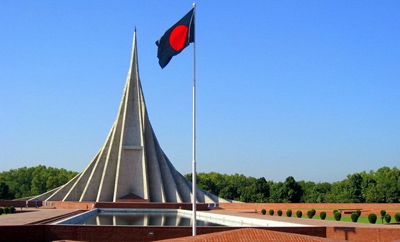DHAKA, March 19, 2019 (BSS) – The government has taken elaborate
programmes to celebrate the 49th Independence and National Day on March 26
with a fresh vow to uphold the spirit of the Liberation War.
On this auspicious occasion, glowing tributes will be paid to the martyrs
and veterans of the War of Liberation.
President Md Abdul Hamid and Prime Minister Sheikh Hasina will place
wreaths at National Memorial, Savar, in the early morning as a mark of
profound respect to the memories of the martyrs.
Later in the day, the families of Bir Shreshthas, war-wounded freedom
fighters, members of the diplomatic corps, leaders of different political
parties, social, cultural and professional bodies and people from all walks
of life will place wreaths at the National Memorial.
On the eve of the Independence Day, President Md Abdul Hamid and Prime
Minister Sheikh Hasina will issue separate messages, calling upon the nation
to uphold the spirit of the War of Liberation to fulfill the dreams of the
valiant freedom fighters, who embraced martyrdom for the cause of their
beloved motherland.
The day is a public holiday.
The national flag will fly atop all government and private buildings while
all streets and important city intersections will be tastefully decorated
with national and multi-coloured miniature flags and festoons.
Important buildings and establishments as well as city streets and islands
will be illuminated with colourful lights. Eminent singers will sing
patriotic songs on mobile trucks in the city, arranged by Mass Communication
Department.
National dailies will bring out special supplements while Bangladesh
Betar, Bangladesh Television, private radio stations and television channels
will air special programmes highlighting the significance of the day.
Bangladesh Shilpakala Academy, Bangla Academy, National Museum, Liberation
War Museum, Bangladesh Shishu Academy, and other social and cultural
organisations will arrange discussions, cultural programmes, painting
competition for children, sports competition and documentary exhibition.
Reception will be given to freedom fighters and the members of martyred
freedom fighters at city, zila and upazila levels on the day, while
Bangladesh Postal Office will publish commemorating postal stamps.
Special prayers will be offered in all mosques, temples, churches and
other places of worship across the country seeking divine blessings for the
eternal peace of the departed souls of Father of the Nation, four national
leaders, martyrs of the War of Liberation and all other patriotic sons of the
soil.
Improved meals will be served to the inmates, patients of hospitals, old
homes and other public institutions to mark the day. The country’s all
children’s parks and museums will remain open for all.
The national anthem ‘Amar Sonar Bangla’, written by Nobel laureate
Rabindranath Tagore, will be sung simultaneously across the country and
Bangladesh missions abroad on the Independence Day.
Prime Minister Sheikh Hasina will lead the nation in singing the national
anthem at Bangabandhu National Stadium on that day.
According to Banglapedia, founder of the country Sheikh Mujibur Rahman
announced the declaration of independence soon after the Pakistani army
cracked down on the fateful night of March 25, 1971. The declaration of
independence was soon put on air by wireless.
The declaration was first broadcast by Awami League leader MA Hannan from
Kalurghat Radio Station in the port city Chattogram on March 26, 1971.
The Pakistani military junta in their monstrous outburst unleashed a
bloody holocaust breaking the silence of the night following March 25 in 1971
when they mercilessly killed hundreds of innocent sleeping Bangalees,
including teachers, students, police, soldiers, pedestrians and rickshaw-
pullers, here.
Bangladesh emerged as an independent and sovereign country on December 16,
1971 with the surrender of the Pakistani occupation forces, who killed three
million innocent people, perpetrated atrocities on 200,000 (two lakh)
Bangalee women and set fire on lakhs of houses across the country during the
nine-month war.



